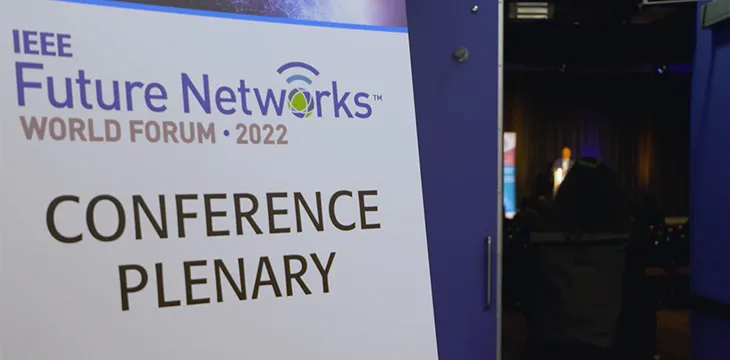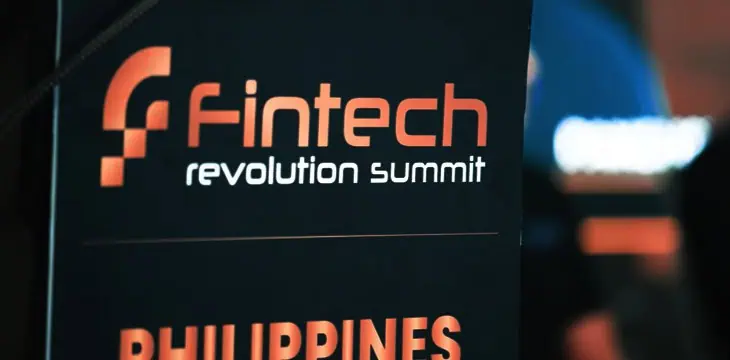|
Getting your Trinity Audio player ready...
|
The 2022 Montreal leg of the IEEE’s flagship conference, the Future Networks World Forum, took place October 12-14 in Palais des Congrès right in the middle of town. According to Latif Ladid, president of the IPv6 Forum and key organizer of the conference, the event returned to Montreal due to the city’s vibrant 5G ecosystem and an appetite for future technologies.
“We were thinking about what should be the next name of this conference in order to address not only 5G and 6G, but also other things. So that’s why we called it Future Networks,” Ladid told CoinGeek.
“We are going to look at how to integrate all kind of technologies together. That’s why we created the symposia for optical networks as well as a vehicle to explore autonomous driving and also for horizontal applications, especially solutions for security. And one of them is blockchain,” he added.
The agenda’s inclusion of blockchain technology was a driver for a number of the professionals and academics in attendance, especially from an enterprise level perspective.
“I have to say, blockchain is feasible and it will emerge strong. It’s a great, great platform bringing a lot of value,” said speaker Giovannni Franzese, head of Enterprise Blockchain Execution at Ericsson.
“If you want to develop a successful application, you need to start from the baseline, which is blockchain, but then you need to pay attention on the rope up of the application,” he added.
Curated by Ladid himself, the “IPv6-based 5G, IoT, Cloud Computing and Blockchain” session was a hit, including in-person speakers Dr. Craig Wright, chief scientist of nChain, and Ralph Wallace, IPv6 Lead at Verizon.
Wallace emphasized the role that IPv6 plays in peer-to-peer, verified transactions.
“I don’t care if it is from San Francisco to Washington, D.C., I don’t care if it’s from Seoul to London. Don’t care. Because you have it now as point to point. That’s what IPv6 brings to the table,” he said.
“And because of that flat topology, it makes it so much easier to have this person here and understand this person here and here’s that transaction, which is the core for Bitcoin,” Wallace added.
Dr. Wright’s explanation of how Bitcoin in its original form was built with IPv6 in mind was a key component of the panel, enlightening just about everyone in the room.
“The original model of Bitcoin, the primary way of doing it was to send information between users directly, with only a backup putting it on nodes and finding it as a temporary solution in the past,” he explained.
“The only way that we’re going to get direct communication between machines, people, everything is to have more and more IP addresses, which is IPv6, and that means direct communication everywhere,” he said.
“And with multicast, we have all the bandwidth benefits that we have because of sending one packet to potentially millions of individual nodes on a network simultaneously,” Dr. Wright added.
Also attending in person from nChain were Senior Researchers Jack Davies and Alessio Pagani, authors of papers that were reviewed and accepted by the Future Network World Forum program committee prior to the event. They talked on IPv6, increasing Bitcoin scalability and educating the world on how IPv6 and the Bitcoin protocol work together.
“We’re looking at different ways of using Bitcoin in the context of future networks using things like IPv6 to enable data streaming over Bitcoin payment channels,” Davies revealed.
“So how can we do things like pay as you go video streaming or music streaming, what you pay using micropayments every second, for example, of what you’re streaming,” he added.
Pagani emphasized his focus on scalability and provided examples of how scalability is at the core of everything nChain is working on.
“Another approach for scalability is to have peer to peer transactions, meaning that if I want to send a payment to you using Bitcoin, you shouldn’t go through the Bitcoin network, but it should be peer to peer, from me to you, and then it’s your responsibility to publish it,” he explained.
“And here we presented our new research that we did at nChain, where we used a novel protocol developed a few years ago by Google, basically to allow the exchange of value peer to peer using the Bitcoin network,” Pagani added.
Of course, it is one thing to talk about research and the potential of future technologies and another to put it all into practice.
Franzese is proud of the progress Ericsson is making with blockchain technology and provided details on three solutions that are already live internally. At present the company is using a private blockchain for these solutions, but in the future, Franzese plans on upgrading to a public blockchain that best suits Ericsson’s needs.
“There is a similarity of analogy on the adoption of the cloud. If you remember, the big corporates, they first started with the private cloud. And then when we got to confidence with the technology, then we moved to the public. For blockchain, the pattern is exactly the same,” he pointed out.
“I have to say Ericsson is one of the most advanced ones using private blockchain platforms and then of course, the longer term vision is to embrace public, but this will take a little bit of time. But the pattern is exactly the way the cloud evolved,” he added.
Time will tell which public blockchain is best, however the time is now to start exploring and innovating with blockchain technology and the same goes for IPv6. The IEEE Future Networks World Forum is key in pushing these technologies forward because of the extensive education it provides and the thought leaders it attracts, with many more installments coming up in cities such as Exeter, Istanbul and Alexandria.
“We have to innovate with IPv6 now because we must grab for the gusto. We must, we must. We must say this is the right way to get to the future and doing it the right way with the right people and the right technology, that’s great,” Wallace said.
Watch: Global IoT Summit Dublin 2022: Why IPv6 is necessary for IoT world

 09-19-2025
09-19-2025 





